
- This event has passed.
African Marine Waste Network Conference
April 20, 2020 @ 08:00 - April 24, 2020 @ 17:00
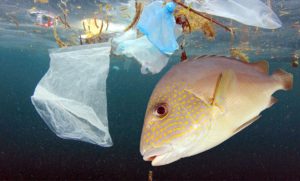 The theme of the conference – Towards Zero Plastics to the Seas of Africa – indicates a drive to stop plastics and other waste on land, at source, from finding its way to the seas.
The theme of the conference – Towards Zero Plastics to the Seas of Africa – indicates a drive to stop plastics and other waste on land, at source, from finding its way to the seas.
This also means cleaning up the plastics that are already in the environment. The underlying philosophy is that if plastics are not in the natural environment, they cannot be blown or washed into the seas.
Plastics touch the lives of everyone, everywhere, every day. It is a wonderful material, but poorly managed. This conference is for everyone, for all people from different disciplines to work together and be a part of leading Africa to zero plastics to the seas. Delegates are invited to show what they are doing or believe should be done to achieve this movement and goal.
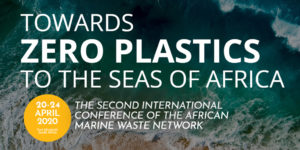
The Towards Zero Plastics to the Seas approach provides a focus which enables people to set goals and measure progress, ideally against time frames. It is valuable in setting frameworks to guide the development of National and Regional Action Plans that are so important to Africa. The conference is an opportunity to agree on best practices and to explore ways to measure progress towards Zero Plastics to the Seas, and ultimately measure progress towards the achievement of Sustainable Development Goals and the effectiveness of actions taken.
As the goal of the conference is to provide a platform that will contribute best practice recommendations for possible inclusion in the evolving action plans within various parts of Africa, the keynote, plenary, parallel session speakers and the discussion groups, panels and posters will all be geared towards finding solutions as we move Towards Zero Plastics to the Seas of Africa.
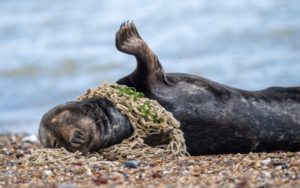
As the goal of the conference is to provide a platform that will contribute best practice recommendations for possible inclusion in the evolving action plans within various parts of Africa, the keynote, plenary, parallel session speakers and the discussion groups, panels and posters will all be geared towards finding solutions as we move Towards Zero Plastics to the Seas of Africa.
If you are involved in any aspect leading to better managing plastic in a way that your efforts are reducing the amount that might enter the environment and make its way to the seas, then plan to be at the conference.
The programme is being developed so that every aspect of the challenge is examined. For example, what is it that producers, converters, retailers and recyclers are doing or should do to move from their present situation to reach zero plastics to the environment? All forms of business, including the financial sector have roles to play in tackling this global crisis. The powerful role of civil society, including all consumers must be included in discussion. Are there real alternatives to plastics and what are the benefits, challenges and misconceptions regarding alternatives?
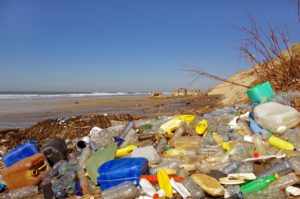
If we are to track progress towards zero plastics to the seas and evaluate the success of mitigation strategies, then we need to develop baselines that are sensitive enough to detect change. Researchers will describe how baselines are developed and changes measured, the value of remote sensing, they will discuss the manner in which plastic moves from source to the sea, the value of measuring plastic accumulation on land, in waterways and along the shores, valuable contributions of citizen scientists, they will range from the largest macroplastics (megaplastics) to the tiniest of microplastic (nanoplastic) research. Some will talk about plastics from ships and ghost gear from fishing fleets, others may present on the importance of mapping and predictive models. Indeed, all types of scientific research, including progress towards plastic replacements, that can make contributions towards reaching the goal of zero plastics to the seas provide valuable discussion points.
A major challenge and essential ingredient for success is the need to encourage people to want to change their behaviours across a huge diversity of socio-economic and cultural circumstances, considering history, perceptions, taboos and more. We need to recognize that the issues are so dominating, intricate and important that communications and education is essential to make the difference required.
A truly important part of the conference will be to examine the power of the youth in Africa and the opportunities to encourage them to play leadership roles.
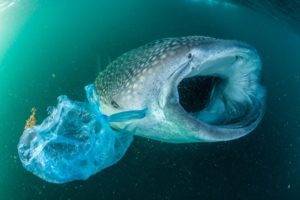
Perhaps the concepts of the circular economy and new plastics economy need to be remoulded to the broad spectrum of African circumstances, particularly if we are to change for the better the lives of impoverished people in Africa through the development of appropriate, innovative economic incentives and enterprises. Do we have any realistic understanding of the value of plastics that are lost from Africa, but which could contribute to local, national and regional economies? Do we know the costs to Africa of plastic pollution in terms of tourism and through impacts on ecological goods and services? Given the power of the economic driving forces, speakers in these disciplines are encouraged to share their thoughts.
The most valuable output of the conference is to ensure that the best practice recommendations are made available to countries, municipalities and regions to assist in preparing national and regional action plans for better managing of plastics. To achieve this the experience and suggestions of policy makers in governments, regional organisations, and particularly municipalities will be critically important. Indeed, a goal of the conference will be to work towards defining the actions needed to help municipalities improve the management of waste now and for the future, especially in the face of growing populations.
- Register here.


